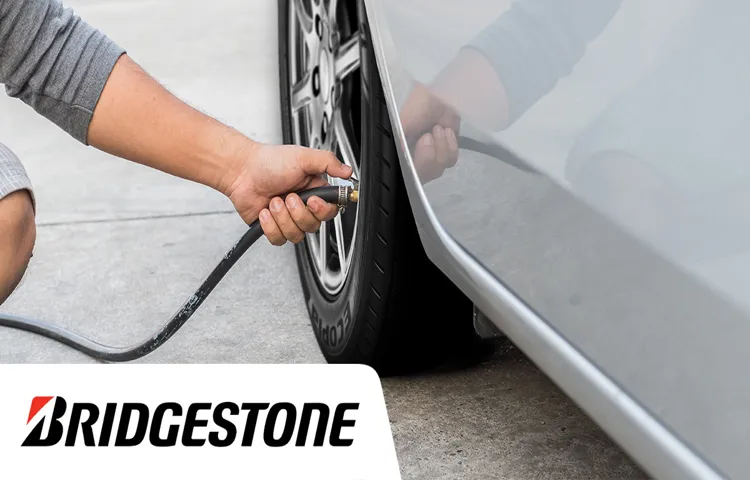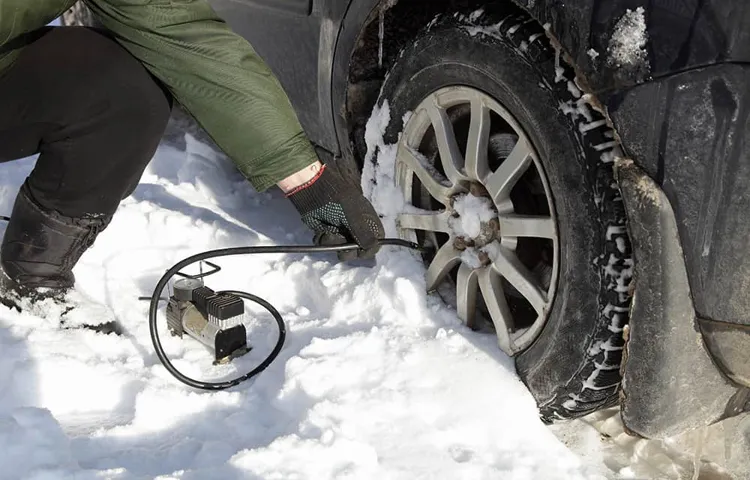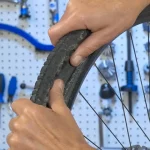Have you ever noticed that your car tire seems to lose air pressure during the colder months? You might be left scratching your head, trying to figure out what’s going on. Why does this happen? Well, the answer lies in the science behind air pressure and temperature. As the temperature drops, the air molecules inside your tire begin to slow down and move closer together, causing them to take up less space and leading to a decrease in pressure.
This is why checking your tire pressure regularly is so important, especially during the winter months when the temperature drops. But don’t worry, there are ways to prevent this from happening and keep your tires properly inflated. So, let’s dive deeper into the reasons behind this phenomenon and how you can stay prepared to face this issue.
Table of Contents
Understand Tire Pressure
If you’re wondering why your tire keeps losing air when it’s cold outside, the reason could lie in something as simple as tire pressure. When air gets colder, it contracts and reduces tire pressure, leading to a loss of air over time. Therefore, during the winter months, it’s essential to keep a check on tire pressure and inflate the tires correctly to maintain optimal pressure levels.
A loss of pressure over time can lead to poor tire performance, lower fuel economy, and even potential safety risks. So, if you’re experiencing frequent deflation issues in your vehicle’s tires, checking for the correct tire pressure could be the first step in resolving the problem.
Factors that Affect Tire Pressure
Understanding tire pressure is an essential aspect of vehicle maintenance. Various factors affect tire pressure, including temperature, altitude, and load weight. High temperatures typically lead to an increase in tire pressure, while cold temperatures result in a decrease in pressure.
Altitude is another critical factor, and as you move to higher elevations, the air pressure decreases, causing the tire to lose pressure. The weight carried by the vehicle also puts pressure on the tire, and this affects tire pressure levels. As such, it is crucial to check tire pressure regularly to ensure optimal performance, safety, and fuel efficiency.
Failure to maintain the correct tire pressure can result in premature tire wear, reduced gas mileage, and increased risk of accidents. Therefore, it is essential to keep your tires inflated and check the pressure regularly to prevent any issues. You can use a tire gauge to check the pressure readings and refill the tires when necessary, ensuring they are always at the recommended level.
By doing this, you can maintain your tire pressure and stay safe on the road.

Importance of Maintaining Proper Tire Pressure
Maintaining proper tire pressure is crucial for both safety and performance while driving. Understanding tire pressure can start with checking your vehicle’s owner manual, which will outline the recommended pressure for your car’s tires. It’s important to note that over-inflated or under-inflated tires can negatively affect your car’s stability, braking, and fuel efficiency, as well as potentially lead to a blowout.
To avoid these issues, regularly check your tire pressure with a tire gauge and adjust as necessary to maintain the recommended levels. Think of it like maintaining a healthy blood pressure – keeping your tires at the right pressure levels ensures they can function optimally and helps prevent potential hazards on the road. So, make it a habit to regularly check and maintain your tire pressure for a smooth, safe, and efficient ride.
Impact of Temperature on Tires
If you’ve ever left your car parked overnight in chilly temperatures, you may have come back to find that your tire pressure has decreased. You’re not alone – this is a common issue drivers face during colder months. The reason behind this phenomenon is due to the impact of temperature on your tires.
Cold air causes the air inside your tires to contract, leading to decreased pressure levels. Additionally, your tires’ rubber tends to stiffen up in colder temperatures, making it harder for them to maintain their shape and pressure. This can cause your tire to lose air and become underinflated, which can lead to a series of issues such as reduced tire lifespan, decreased fuel efficiency, and potential safety hazards on the road.
If you notice your tire pressure dropping during colder months, be sure to check and maintain proper tire pressure levels regularly, and consider purchasing winter tires that are designed to perform optimally in colder temperatures.
How Cold Weather Affects Tire Pressure
As temperatures drop during winters, tire pressure tends to decrease due to the cold air’s contraction inside the tire. This contraction leads to a decrease in tire pressure, as the air molecules become more closely packed and exert less pressure per unit of volume. The tire pressure can drop by 1 PSI (pound per square inch) for every 10°F temperature decrease.
Low tire pressure can cause various issues like lower gas mileage and impact fuel efficiency by 0.3% for every 1 PSI drop-in pressure. Moreover, low tire pressure can increase the stopping distance, decrease road grip, and increase the risk of a tire blowout, especially on icy and snowy roads.
The solution to this problem is to check your tire pressure frequently during winters and fill them as per your vehicle’s recommended tire pressure. Ensure you check your tire pressure after a few minutes of driving when the tire is warm to get a precise reading.
Why Tires Lose Pressure in Cold Weather
Tires are the unsung heroes of the road, and they work tirelessly to keep us safe and moving. However, during extreme weather conditions like the cold season, tires tend to lose pressure causing concerns for vehicle owners. The impact of temperature on tires is significant and can lead to dramatic changes in tire pressure.
When it gets colder, tires lose pressure because the air molecules inside them contract, reducing their volume. It’s like a balloon that loses air when it becomes cold or is in a cold environment. This phenomenon is why tire pressure consistently drops in the winter months, and it’s particularly noticeable in the morning when the temperature is at its coldest.
Experts recommend keeping your tires properly inflated, as it’s crucial for your safety. By maintaining the correct tire inflation pressure, you’ll save money on fuel, enhance your vehicle’s handling and braking performance, and extend the tire life. In conclusion, it’s critical to check your tire pressure regularly, especially during winter, to ensure that your tires are safe and ready to handle any weather conditions.
Impact of Heat and Sun on Tires
Tires can withstand a lot, but high temperatures can result in a negative impact on them. Experts recommend checking tires regularly to ensure they’re well-maintained and not damaged due to overheating. Extreme heat can cause tires to become overinflated, which may result in a loss of traction and, in turn, risk of an accident.
The scorching summer heat can also lead to tire dry rot, which occurs when the rubber breaks down and cracks, leading to a reduction in its flexibility and safety. Tire manufacturers recommend keeping them cool in hot weather by parking in shaded areas, maintaining recommended inflation levels, and reducing driving speeds. Taking these precautions can extend the life of your tires and help keep you safe while on the road.
Preventative Measures
“Why does my tire keep losing air when it’s cold?” This is a common question among car owners during winter months. The answer is simple – the cold weather causes the air inside the tire to contract, which leads to a decrease in tire pressure. This can result in a flat tire or poor handling of the vehicle on the road.
To avoid this problem, there are several preventative measures you can take. First, make sure your tires are properly inflated according to the manufacturer’s specifications. Second, check your tire pressure frequently, especially during temperature changes.
Third, consider investing in winter tires, which are designed to perform better in cold weather conditions. Lastly, avoid hitting potholes or other road hazards, as they can cause damage to your tires and result in air leaks. By taking these preventative measures, you can ensure your tires stay properly inflated and avoid any unexpected flat tires or accidents on the road.
Check Tire Pressure Regularly
As a car owner, it’s important to prioritize preventative measures to keep your vehicle running smoothly and avoid unnecessary repairs. One essential aspect of car maintenance is checking tire pressure regularly. Proper tire pressure is crucial for optimal performance, fuel efficiency, and overall safety.
But how often should you check your tire pressure? It’s recommended to check them at least once a month and before long trips. In addition, remember that changes in temperature can affect tire pressure, so it’s essential to check them more frequently during extreme weather conditions. Checking tire pressure may seem like a small and simple task, but it can make a significant difference in your driving experience and save you from costly repairs in the long run.
So, grab your gauge and check your tire pressure regularly to keep moving safely on the road.
Properly Inflate Tires for Cold Weather
Properly Inflate Tires for Cold Weather With the cold weather rolling in, it’s important to take preventative measures to ensure your car is running smoothly. One often overlooked aspect is tire pressure. Cold temperatures can cause a drop in tire pressure, leading to decreased traction and potentially dangerous driving conditions.
By properly inflating your tires, you can prevent this from happening. It’s advisable to use a tire pressure gauge to check the pressure and inflate to the manufacturer’s recommended PSI. Overinflating your tires can also be dangerous, as it can cause them to burst in the cold temperatures.
Remember, even if your car has a tire pressure monitoring system, it’s always a good idea to double-check the pressure manually to ensure your safety on the road. Taking these small steps can make a big impact on your winter driving experience.
Conclusion
As the temperatures drop, it’s not just your favorite fleece blanket that feels the chill, your tires do too! The scientific explanation behind it is the molecules that make up the air inside your tire move more slowly in colder temperatures, leading to a decrease in pressure. So, it’s not that your tire has a grudge against winter, it’s just a natural consequence of physics! Stay warm, and remember to check your tire pressure regularly!”
FAQs
Why do tires lose air pressure in cold weather?
Tires lose air pressure in cold weather due to the contraction of air molecules. As the temperature drops, the air inside the tire becomes denser and takes up less space, causing a drop in pressure.
Should I worry if my tires lose air pressure in cold weather?
Yes, it is important to maintain proper tire pressure at all times, as low tire pressure can affect handling, fuel efficiency, and tire wear. Make sure to check and adjust your tire pressure regularly, especially during colder months.
How much air pressure should I have in my tires during winter?
The recommended tire pressure for your vehicle can be found in the owner’s manual or on a sticker inside the driver’s side door. In colder weather, you may need to add a few extra pounds of air pressure to compensate for the drop in temperature.
Is it normal for tires to lose air pressure overnight during winter?
It is normal for tires to lose a small amount of air pressure overnight, particularly in colder weather. However, if you notice a significant drop in pressure, it could be a sign of a leak or other issue and should be addressed promptly.
Can driving on under-inflated tires damage my vehicle?
Yes, driving on under-inflated tires can cause a variety of problems, including reduced fuel efficiency, uneven tread wear, and tire failure. In extreme cases, it can even lead to a blowout and loss of control while driving.
How can I check and fill my tire pressure during winter?
You can check your tire pressure using a tire pressure gauge, which can be purchased at any auto parts store. To fill your tires, use an air compressor or visit a gas station with a tire inflator. Don’t forget to check your spare tire as well!
What should I do if my tires keep losing air pressure despite being properly inflated?
If your tires continue to lose air pressure, it could be a sign of a leak or other issue. Have your tires inspected by a professional mechanic to identify and address any underlying problems.



